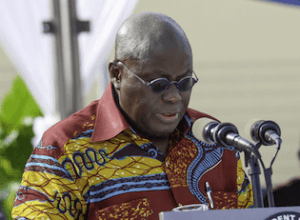Ghana to champion African Light Source – Akufo-Addo

Ghana will champion the African Light Source (AfLS) to make it an official project of the African Union (AU) and ECOWAS, President Nana Addo Dankwa Akufo-Addo, has said.
President Akufo-Addo made the disclosure on Tuesday, in a speech read on his behalf at the opening of the Joint Second International Conference of the African Light Source (AfLS2) and Pan African Conference on Crystallography (PCCr2) in Accra.
A light source is a seed and magnet for high tech industry and all kinds of associated research institutions in all fields.
The AfLS is a growing movement seeking to construct an advanced light source somewhere on the African continent in the near future.
It would be the most important, common, shared, very-large scale, scientific infrastructure for Africa.
Crystallography is the science that examines the arrangement of atoms in solids; there is therefore, a connection of science of Crystallography and much of the work being done at the Advanced Light Source Facilities.
President Akufo-Addo said, Ghana would continue to advocate for multilateral relationships between the world’s light sources and various AU member states, along with their universities, research institutions and commercial industries.
He said, Ghana would support the installation of the first light source on the African continent possibly in the country.
“The purpose of such an installation is to provide a first step to build a future light source as it will provide state-of-the-art tool for learning of light sources techniques as well as with hands-on operation of accelerator technologies,” he said.
“Support bursaries for students in synchrontron-related science and technology, as well as visiting appointments for post-PhD scientists and engineers, both Ghanaian light sources and personnel from light sources to Ghana.”
He said, the AfLS would contribute significantly to the African Science Renaissance, the return of the African science diaspora, the enhancement of university education, the training of new generation of young researchers, the growth of competitive African industries, and the advancement of research that addresses issues, challenges and concerns related to Africa.
The joint second AfLS2 and the PCC2 is on the theme “Crystallography a Tool for Sustainable Development in Africa”.
The five-day meeting is being attended by more than 300 participants from across the African continent.
It is under the auspices of the International Union of Crystallography, UNESCO, International Atomic Energy Commission, the Light Sources for Africa, Asia, Americas and the Middle East Project (LAAAMP), and the African Academy of Sciences; the College of Basic and Applied Sciences of the University of Ghana, in collaboration with the Ministry of Environment, Science, Technology and Innovation.
The AfLS2 to be held in Africa for the first time; seeks to deliberate on the future establishment of a Pan African Synchrotron Light Source research facility on the African continent.
It comes after the successful first African Light Source Conference and Workshop (AfLS1) held at the European Synchrotron Research Facility (ESRF) in Grenoble-France in November 2015.
Following a successful conference held in 2016 in Dschang, Cameroon, (PCCr1); this conference (PCCr2) aims at bringing together African crystallographers, mineralogists, structural scientists and biologists to increase awareness of crystallography and improve the educational opportunities for African researchers and students of all levels.
The variety of activities will provide opportunities to engage with the scientific community, from expert scientists to young researchers and students of all ages, as well as government representatives and policy-makers in Ghana.
Other African Scientists using, practicing and/or developing crystallographic methods would also meet to build a network of African academics, scientists and engineers, which should result in the launch of the African Crystallography Association.
Professor Samuel Kwame Offei, the Pro-Vice Chancellor, Academic and Students Affairs, University of Ghana, said the University was committed to promoting science and technology education to the highest level possible.
He said currently, the University is the host of the state-of-the-art x-ray diffractometers (XRD), neuron magnetic resonance spectrometer (NMR) and a scanning electron microscope (SEM); scientific infrastructure, capable of facilitating industrial research, hands-on experiments and demonstration, to support the minerals, oil and gas industry of the African continent.
Prof Simon Connell, Chair, African Light Source Project, said light source had massively transformed science, human capacity training and competitive industry in the countries which had them.
“It’s very expensive, but highly productive and comes with a strong business and science case,” he stated.
Source: GNA
